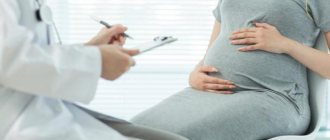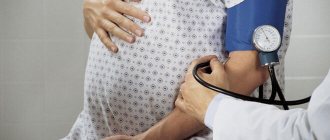When the expectant mother first learns about her new position, she is overwhelmed by many emotions, including fear. She listens to all her sensations and responds to every alarm signal from the body. The same should be done if the uterus hurts during pregnancy. This symptom should not be missed, because normally it should not be present.
A woman should not worry if she feels some tingling or pinching in the uterine area. This indicates implantation of the embryo on its wall. This sensation may occur 6-12 days after conception. Such pain in the uterus in the early stages of pregnancy should not be particularly noticeable.
Is this normal?
During pregnancy, the uterus enlarges and becomes heavier. Due to this, the load on those ligaments that hold it in the pelvis increases. Due to the increase in size, other organs are displaced and the abdominal muscles become tense.
This condition is normal. A woman may experience weak, long-term or short-term strong, as well as stabbing pain in the uterus during pregnancy - they should not cause fear. It is advisable to lie on your side. But if the pain does not go away, you need to consult a gynecologist.
Premenstrual uterine pain
Painful contractions of the uterus before menstruation are known as dysmenorrhea, which is estimated to affect more than half of young women. These types of uterine pain can be divided into primary menstrual pain and secondary menstrual pain. The cause of dysmenorrhea is excess estrogen production in the second half of the cycle. Due to hormonal imbalances, the uterus produces hormones called prostaglandins, which cause painful contractions.
Pain in the uterus is felt not only in the lower abdomen, but also in the sacral region of the back, and can even radiate to the hips. In addition, women suffer from nausea or headaches, diarrhea and mood swings.
Causes
The uterus is a muscular organ, so increased tone may be normal for it. In the early stages, it occurs due to hormonal changes in the female body. At 6-8 weeks, such pain appears due to the fact that the embryo attaches to the wall of the uterus. This physiological process does not require treatment. In mid-pregnancy, pain occurs due to the strong growth of the uterus. In the third trimester, this condition is a signal of preparation for childbirth. The pain appears sporadically. To stop them, relaxing and taking an antispasmodic is enough.
Sometimes pain in the uterus during pregnancy occurs not because of hormonal changes, but simply as uterine spasms. For example, this can happen after sex or when your bladder is full.
Pain in the uterus - causes
Pain in the uterus, which is perceived as pain in the lower abdomen, can have different causes. Very often this is pain associated with the menstrual cycle, which can appear in the middle of the cycle, when the Graaffian follicle ruptures (the so-called ovulatory pain) or the so-called painful menstrual syndrome, which occurs immediately before menstruation and lasts 2-3 days after the onset of menstruation.
Painful uterine contractions can also be caused by:
- endometritis
- pelvic inflammation
- so-called somatic projection of mental disorders, which most often arise as a result of physical and sexual violence
- pain in the ovaries
- ovarian cyst
- Ectopic pregnancy
- submucosal uterine fibroids
- torsion of the appendages (most often occurs during pregnancy, ovulation induction and ovarian enlargement above 4 cm)
- endometrial and ovarian tumors
- menstrual irregularities in women with hypothyroidism
- intrauterine device, which can cause inflammation
- chronic inflammation of the appendages (can be caused by E. coli, gonorrhea, streptococci, staphylococci, chlamydia)
- defects in the structure of the uterus (for example, a fully expanded hymen blocks the outflow of blood, which remains in the uterus, causing painful contractions).
About
Types of pain
A woman can usually describe what kind of pain in the uterine area she experiences during pregnancy.
It is worth considering in detail all the varieties:
- stabbing pains may indicate appendicitis and urolithiasis.
- Cutting. Occurs in the early stages. If they are felt on the left or right, this may be ectopic development of the fetus. In some cases, this pain extends to the anus and legs. In the area of the womb, such sensations arise due to interruptions in the functioning of the urinary system.
- Tingling. In the first trimester, they appear due to the preparation of the ligamentous apparatus of the uterus so that the fetus can develop. In this case, the ligaments are stretched. Most often, discomfort is observed in women who experience discomfort during menstruation.
- An aching character localized in the right hypochondrium with irradiation to the lower abdomen manifests itself in the case of an inflammatory process in the gallbladder.
- Cramping pain occurs when there is a threat of miscarriage. You must consult a doctor immediately.
- Pulling can also be a harbinger of interruption. If they are accompanied by bloody discharge, placental abruption can be diagnosed.
- Severe pain at the end of the third trimester indicates the body is preparing for childbirth. At this moment, the pelvic bones diverge, which is why all the unpleasant sensations are concentrated in the area of the sacrum and womb.
- Dull, incessant pain in the navel area, coupled with loose stools, fever and nausea indicate pathologies of the gastrointestinal tract.
- If the uterus hurts as if during menstruation , but already while expecting a baby, this is a signal of the attachment of a fertilized egg to the wall of the uterus. And in the 2nd and 3rd trimester, this indicates a threat of premature birth.
Any pain that continues for a long time and is not relieved by antispasmodics is a reason to urgently call a doctor.
Abdominal pain in women during pregnancy
Abdominal pain during pregnancy is quite common; it can be due to natural causes or have a negative character, but before you panic and worry without a clear reason, you should listen to your feelings and make an appointment with a doctor. This will not be superfluous, since you need to protect your nerves, but you should understand some points yourself.
Types of abdominal pain during pregnancy
Painful sensations can be observed in each trimester of pregnancy and localized in different parts. The most frequently mentioned types are:
- Sharp pain in the groin and pubic area in the early stages (in the first trimester, the presence of pain in the pubic area can be negative. You should consult a doctor immediately);
- Pain in the pubic area in the later stages (during this period, such pain is considered normal if it is nagging and moves from the pubis to the femoral part. This happens because the body is preparing for childbirth. In case of pain when raising your leg up from a lying position, consult a gynecologist );
- A feeling of abdominal tension (considered normal if the pregnancy is progressing well; in the case of a “hard belly” effect, pathologies may be present);
- Pain when the baby kicks (the baby’s activity in the stomach can be unpleasant for the mother, but if you can calm the baby, there’s nothing terrible. And if the kicks are too strong, you should consult a doctor to check for hypoxia (oxygen starvation).
Causes of abdominal pain
Lower abdominal pain during pregnancy can be either natural or require emergency help. The first category includes the following points:
- Minor pulling sensations at 2-3 weeks, when the fertilized egg is implanted into the wall of the uterus;
- Sharp short-term pain. Intensified by sudden movement or lifting of weight, in the first trimester due to muscle stretching and softening of tissues;
- Unpleasant sensations in the third trimester due to the baby moving;
- Nagging pain due to muscle tension and growth of the uterus in the last trimester. As well as a slight divergence of the pelvic bones and training contractions.
To improve your condition when your stomach hurts due to natural causes during pregnancy and does not require medical intervention, follow these rules:
- Walk outside more often;
- Avoid overwork and high physical activity;
- Do special exercises for pregnant women;
- Use a bandage in later stages;
- Try to get more sleep (a pregnancy pillow helps many with this).
A good way to relieve discomfort is to remain in the elbow position for 10-15 minutes (you can do this several times a day). This is worth doing if your stomach hurts during pregnancy and you don’t need the help of a doctor,
If pain occurs when walking
If a woman feels that her cervix hurts while walking during pregnancy, there is no need to worry. This option is considered normal. Minor discomfort may occur due to the fact that the uterus grows and the muscles stretch. Quiet rest reduces the severity of these symptoms. If the pain is severe and acute, then you should consult a doctor.
Women who have encountered this phenomenon need to independently determine where the pain is more localized. It is enough to place your palm on the abdominal wall and slowly press on the stomach, while determining a specific place. This examination must be carried out in a supine position.
In most cases, expectant mothers experience pain when walking after physical exertion, stress or hypothermia. There is no need to take pills, just calm down and relax. But if the ligaments of the uterus hurt so much during pregnancy that they do not allow you to move, this indicates serious pathologies.
Why is the fundal height of the uterus determined during pregnancy?
The female uterus is a unique organ that is capable of stretching during pregnancy and returning to its original size after childbirth.
The uterus consists of a larger part (located), the body above, and a smaller part (cervix), located below. The isthmus connects the body and the neck. The uterus is the highest part of the body of this organ. The wall of the uterus consists of the following layers: inner (endometrium), middle (myometrium), outer (myometrium). The perimetrium, or muscular lining, forms part of the main wall of the uterus. It is due to changes in the myometrium that the size of the uterus increases during midlife. By pregnancy, the walls of the uterus thicken to 3-4 cm, dividing due to the muscle cells of the myometrium. Then the size of the uterus increases only due to stretching and thinning of its latter. During the week of pregnancy, the thickness of the walls of the uterus is 0.5-1 cm.
In a woman of reproductive age, the length of the uterus during pregnancy is 7-8 cm. By the end of pregnancy, the uterus reaches a length of 37-38 cm. Moreover, in the case of polyhydramnios, multiple pregnancy, it can reach even larger sizes.
Enlargement of the uterus during pregnancy begins at 5-6 weeks. First of all, the uterus becomes anteroposteriorly larger in size, then - transversely. At the eighth week of pregnancy, the size of the uterus is increased by two tenths, at one week - three times, at the twelfth - four times.
In the second trimester of pregnancy (week 13-14), a woman’s uterus extends beyond the pelvis. At this stage, a gynecologist-obstetrician can already palpate it through the anterior abdominal wall. It is at this time that the doctor begins to measure the height of the uterine fundus during pregnancy (HH).
The height of the fundus of the uterus during pregnancy is affected by the amount of amniotic fluid, the size and position of the child. uterus The fundus will be higher in case of twins, a large fetus, or polyhydramnios, since in such cases the uterus stretches more. At the same time, the height of the uterine fundus differs by 2-4 cm in different women, due to individual characteristics.
This indicator of the course of pregnancy, starting from the 16th week of pregnancy, is determined at each consultation visit by the woman. To do this, the expectant mother lies down on the couch with her legs straightened and the doctor measures the UMR with a measuring tape. It is best for a woman to empty her bladder before doing this. Thanks. In this study, the doctor can judge the development of the child, his position, and the amount of amniotic fluid.
Cervical pain
While expecting a baby, the cervix takes on its anatomical position. It protects the uterus and appendages from infection. This allows you to more effectively maintain the health of the fetus.
Why does the uterus hurt in the cervical area during pregnancy? Firstly, this may signal hypertonicity. Due to low progesterone levels, such sensations appear. Its deficiency provokes termination of pregnancy. Another reason is an excess amount of prolactin. Often occurs due to nervousness, infection, high physical activity.
Secondly, this may indicate insufficient development of the female reproductive organs. If the uterus has not reached the required size, it will contract during pregnancy, which can cause a miscarriage.
Pathological pain
These conditions include problems that are associated with the threat of miscarriage, ectopic and frozen pregnancy, and placental abruption.
Each case should be analyzed separately:
- Threat of interruption. In this case, the woman feels nagging and aching pain in the uterine area. They may be accompanied by bloody discharge. The progress of the process manifests itself in the form of increased pain, a cramping nature is noticeable. Without specific treatment, premature birth or miscarriage may occur.
- An ectopic pregnancy is the attachment of a fertilized egg outside the uterine cavity. The most common variety is the trumpet one. Painful sensations arise on one side, do not last long, but are intense, up to loss of consciousness. At 8-12 weeks, a rupture of the fallopian tube may occur. Diagnosis occurs using ultrasound, and treatment is only surgical.
- Placental abruption. Can happen at any time. The pain is so severe that the woman has to choose a forced position. There may be no vaginal discharge. There are signs of fetal hypoxia and internal bleeding. If this condition is not treated, there is a risk of intrauterine death of the child. In addition, this is a very big threat to a woman’s life.
- Frozen pregnancy. If the process occurred in the first trimester, a woman may not understand whether the uterus hurts during pregnancy. The doctor will see this by the fact that the size of the organ does not correspond to the standard. Nausea and sensitivity to smells may occur, and then the symptoms suddenly disappear. Cramping pain appears in the lower abdomen.
Pain in the lower abdomen during pregnancy, causes, what to do
Almost every woman during pregnancy at least once experienced nagging or tingling pain in the lower abdomen or a feeling of discomfort. And this is understandable: with the birth of a new life, our body begins to rebuild itself (stretching of muscle fibers, swelling and stretching of ligaments, “divergence” of the pelvic organs occurs). A woman usually experiences such pain in the first few months of pregnancy. Moreover, they most often occur in women who had dysmenorrhea (painful menstruation) before pregnancy.
However, pain in the lower abdomen during pregnancy is not always the result of changes occurring in the body. The appearance of any pain in the abdomen should alert a pregnant woman, since it may pose a possible threat to the fetus (miscarriage). But there is no need to sound the alarm in advance; it is necessary to determine the nature of the pain, its intensity and what it is associated with. Therefore, it is important to see a doctor even if you experience the slightest discomfort in the abdominal area.
Why does my stomach hurt a lot during pregnancy?
Poor nutrition. So, it is clear that pain in the lower abdomen during pregnancy can occur even in an absolutely healthy woman. What are the main causes of pain? Very often, poor nutrition can provoke spasms of the digestive system, which result in pain in the lower abdomen, which is aching in nature. Pregnancy is one of the causes of hormonal changes in the body. Against this background, a woman’s taste preferences also change. While carrying a child, a woman can consume foods that cause various metabolic disorders. For example, a pregnant woman’s abuse of spicy and sour foods can cause irritation of the stomach walls; frequent consumption of sweets can provoke fermentation processes in the intestines and the appearance of dysbiosis. The latter, in turn, can cause bloating. In this case, you should consult with your doctor, who will prescribe special treatment, and of course, switching to a healthy diet is mandatory.
Sprained muscles and ligaments. Quite often, nagging pain in the lower abdomen in a pregnant woman is a consequence of sprained ligaments and muscles that support the uterus. As the fetus grows, the uterus also increases in size, resulting in increased pressure on the ligaments, and as a result, increased pain in the lower abdomen. That is why, with sudden movements, sneezing or coughing, you can feel a sprain, which manifests itself in the form of sharp pain in the lower abdomen. They can also be observed due to overstrain of the abdominal muscles. In this case, pain in the lower abdomen does not pose a danger to the fetus. Such pains during pregnancy do not require any treatment, just a good rest is enough. Doctors recommend relieving cramping pain in the lower abdomen and pelvic area that accompanies a sprain with a warm bath, sitting in which you should relax well.
Enlarged uterus. If a pregnant woman experiences pain in the upper abdomen, the reason for this may be an enlarged uterus, which begins to compress the organs of the chest cavity (liver and gall bladder, digestive organs). The result of this may be a disruption of the bile secretion process, which may be accompanied by pain in the upper abdomen.
Often during pregnancy, a woman feels pain in the abdomen on the right. As a rule, this is due to the position of the fetus in the uterus. Painful sensations may increase when the fetus moves. Usually this process is accompanied by loss of appetite and a feeling of heaviness. Pressure on this area of the abdomen can also cause heartburn, bitterness in the mouth, and bloating.
Ectopic pregnancy. Pain in the lower abdomen can occur against the background of an ectopic pregnancy, in which a fertilized egg implants and develops not in the uterine cavity, but in the fallopian tube (probably due to adhesions). It is very simple to identify an ectopic pregnancy, if you are absolutely sure of your pregnancy, by the accompanying symptoms: fainting, dizziness, nausea, sharp abdominal pain, spotting. A woman is usually referred for an ultrasound examination to reduce the risk of tubal rupture and preserve fertility. The egg, increasing in size, ruptures the walls of the fallopian tube, which is accompanied by unbearable pain and internal bleeding. As a rule, this occurs in the fifth to seventh week of pregnancy. In this case, surgical intervention is mandatory.
Threat of miscarriage. Pain in the lower abdomen in a pregnant woman can also be observed when there is a threat of miscarriage. The cramping pain radiates to the lower back and is long-lasting and aching in nature. In addition, as a rule, such pain is combined with discharge from the genitals, which has a different consistency and color (from brown to bright red). A woman with such pain is immediately sent to the hospital, where hormonal levels are examined, the condition of the fetus is determined, and tests are done for the presence of infections that can cause a miscarriage. Once the cause of the pregnancy disorder has been identified, the specialist prescribes appropriate treatment.
If such pain and accompanying symptoms occur, you should immediately call a doctor. Most likely, in order to maintain the pregnancy, the woman will be admitted to a hospital for some time.
Premature placental abruption. Premature separation of the placenta from the wall of the uterus can also cause sharp pain in the lower abdomen. This phenomenon can be caused by several reasons: toxicosis of the second half of pregnancy, abdominal trauma, hypertension, physical overexertion, etc. In this case, there is a rupture of blood vessels. This process occurs with the simultaneous occurrence of bleeding into the uterine cavity and severe pain. Such symptoms are a good reason to quickly call a doctor, since the only solution in this situation is a quick delivery and stopping the bleeding in the pregnant woman.
Surgical diseases. Surgical diseases in a woman during pregnancy can also cause pain. Often, acute stabbing pain is a sign of acute appendicitis. If a pregnant woman experiences cramping, stabbing pain in the right hypochondrium, there is a possibility that this is inflammation of the gallbladder or cholecystitis. During pregnancy, inflammation of the pancreas or pancreatitis may also occur, which also manifests itself as severe pain in the upper abdomen. Women in this position often experience nagging pain, which becomes intensely stabbing as the bladder fills. In this case, unbearable pain appears precisely at the moment of urination. Such symptoms indicate cystitis or inflammation of the bladder. Quite often, such symptoms are signs of the presence of infectious diseases that are sexually transmitted.
What to do?
It is important to remember that in normal conditions the cervix hurts during pregnancy calmly and unobtrusively. If the sensations become unbearable, acute and frequent, accompanied by bleeding, you should immediately contact your doctor.
If your ligaments hurt, rest will help relieve the discomfort. You can try taking a knee-elbow position to unload the spine. Another good method is to place one pillow under your stomach and squeeze the other between your legs. Taking a warm shower will also relieve symptoms.
The characteristic pain at the beginning of pregnancy quickly passes. The main thing is to be patient and visit your gynecologist regularly. If you follow all his recommendations, you will be able to maintain good health.
Author: Irina Levchenko, doctor,
Useful video about pain in the uterus during pregnancy
Pain in the uterus during pregnancy: what threatens it and how to get rid of the pain? — revealing secrets about pregnancy on Pitanie4Zdravie.ru
Pregnancy makes a woman truly beautiful. But during pregnancy, many questions arise that need to be answered. Especially for you, in the “Pregnancy from A to Z” section, we publish interesting and useful articles about pregnancy, so that this wonderful time for you will be as “problem-free” and joyful as possible.
You can also find here the main signs of pregnancy, how the baby’s fetus develops at different stages of pregnancy, understand what is possible and what is not possible at different stages of pregnancy. Learn more about the effect of various foods, vitamins (for example, the effect of folic acid) on pregnancy.
Pain in the uterus during pregnancy and after sexual intercourse - what causes it?
Pain in the uterus can be a harbinger of many serious diseases, so you should always consult a doctor about it. Among other things, this may be a signal of miscarriage, endometriosis, polyps, developing endometrial or ovarian cancer. In painful conditions, pain is often felt during or after sexual intercourse.
The pear-shaped uterus plays an extremely important role in the body of every woman. It consists of the body of the uterus, isthmus and cervix and connects the vagina to the fallopian tubes and ovaries. It is into the body of the uterus, covered with a mucous membrane, that the embryo is implanted.
Various pathological conditions can develop inside the uterus, so if you experience recurring pain in the uterus, you should consult a doctor. Especially if a woman regularly experiences pain after intercourse, pain in the uterus occurs during pregnancy or is associated with menstruation.











